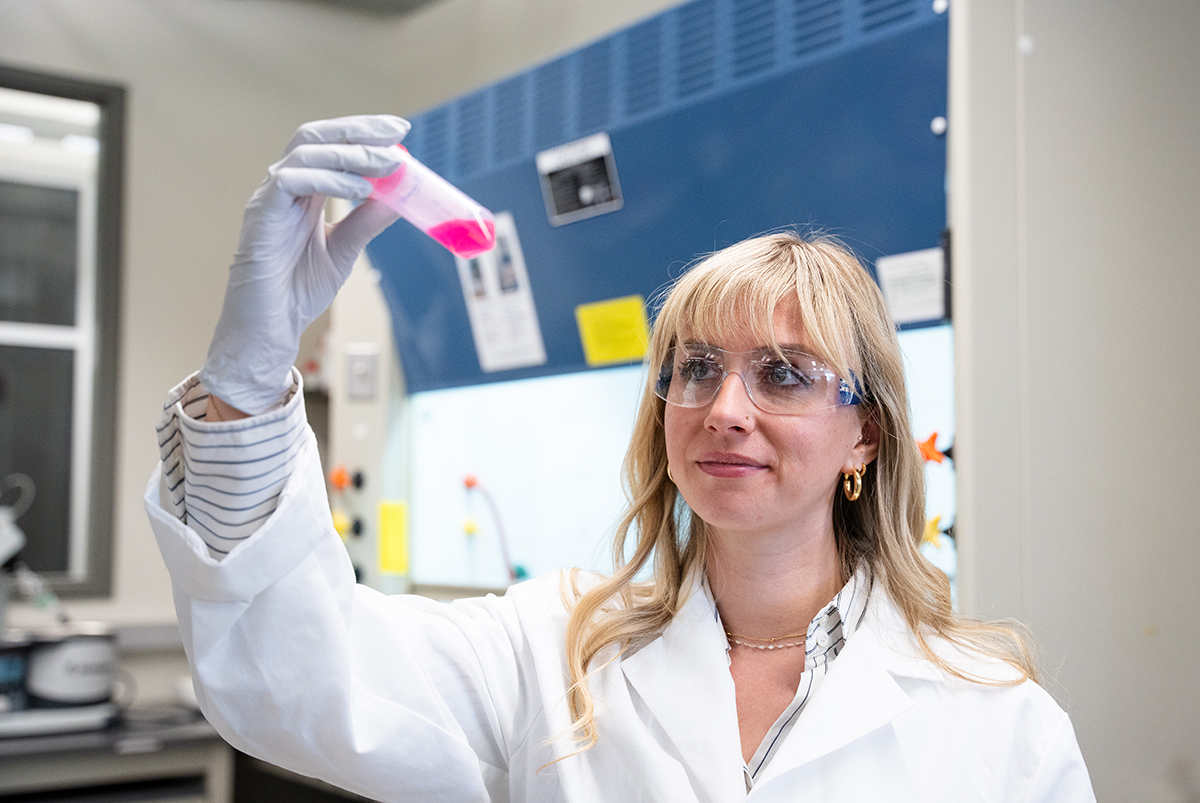Recent News
Not your mother’s nanomedicine: NIH grant targets safer medication for women
October 20, 2025
AI tensor network-based computational framework cracks a 100-year-old physics challenge
September 16, 2025
Postdoctoral research fellow wins 1st place in conference poster presentation
August 25, 2025
Engineering a new treatment for ovarian cancer
June 24, 2025
News Archives
Engineering a new treatment for ovarian cancer
June 24, 2025 - Carly Bowling
UNM faculty member receives grant to study alternative drug delivery

There’s a long way to go when it comes to sex and gender equity in medicine, but engineers at The University of New Mexico hope to close the gap with a new research project exploring alternative treatments for ovarian cancer.
Olivia Lanier, assistant professor in the Department of Chemical and Biological Engineering, received an American Cancer Society Institutional Research Grant sub-award through the UNM Comprehensive Cancer Center to look at how nanoparticle-packed gel could help treat cancer more effectively. The $30,000 grant will run through the end of 2025 and fund her pilot project titled, “Targeted Vaginal Delivery of FRα-Specific Lipid Nanoparticles Using Thermo and Enzyme-Responsive Hydrogels for Platinum-Resistant Ovarian Cancer.”
“Studying drug delivery based on sex is critical for advancing health equity because women have historically been excluded from biomedical research, creating a medical landscape that favors the traditional male body. Despite the enormous potential of nanomedicine, women’s health applications account for less than 1% of all nanoparticle-related research on PubMed,” Lanier said. “By developing targeted therapies that account for female-specific biology, such as hormones, reproductive organs, and mucus barriers, we can improve treatment outcomes and ensure healthcare technologies benefit everyone.”
Ovarian cancer that returns after chemotherapy can be especially difficult to treat. Newer drug options like Elahere, also known as mirvetuximab soravtansine-gynx, have demonstrated success treating resistant forms of ovarian cancer, but have also been shown to cause eye problems, ranging from blurred vision to corneal disorders, cataracts and dry eye, in more than half of patients treated with the drug. Lanier’s project will explore how nanoparticles suspended in a hydrogel and administered vaginally could mitigate this ocular toxicity. She hypothesizes the technology could target ovarian cancer tissue more effectively than systemic delivery methods, thereby causing fewer adverse reactions in the eye.
The hydrogel is designed to improve local retention and release of drug-loaded nanoparticles while minimizing systemic side effects. Throughout the rest of the year, Lanier’s lab will work to refine the nanoparticle technology, then test it on patient-derived xenograft samples and animal membranes.
The research is part of a larger goal Lanier has for the Nanomedicine Toward Health Equity Lab –– to advance women’s healthcare and develop new drug delivery options for diseases associated with health disparities. She is interested in examining how differences like chromosomes, hormones, reproductive organs, menstrual cycle fluctuations, fat distribution and age can impact the effectiveness of drug delivery. For example, because the process of developing blood cells, known as vascularization, changes in ovaries and breast tissue throughout the menstrual cycle, there could be ideal times to deliver targeted treatments for endometriosis and various cancers. Understanding how these differences manifest, not only throughout the menstrual cycle, but also through perimenopause, menopause and after hysterectomy, offers scientists the potential to greatly improve treatment options for various diseases. Preliminary results from Lanier’s research as a postdoctoral fellow at University of Texas at Austin suggested that sex-based differences may affect how nanoparticles are taken up by cells, informing future studies on targeted delivery. Advancing research into sex-based differences is critical to developing effective drug dosing for all people.
Lanier’s pilot proposal grant will fund the costs of nanoparticle and hydrogel characterization and sample experimentation.
The institutional research grant awarded to UNM aims to increase the number of cancer-related research projects at The University through pilot awards to junior faculty members across campus. Michelle Ozbun, Maralyn S. Budke Endowed Professor of Viral Oncology, is the primary investigator and program director on the institutional research grant. Recipients like Lanier have one year to conduct the pilot project and produce preliminary results, ultimately aiming to make the faculty competitive for national research grants.
Throughout the project, Lanier will be mentored by UNM Cancer Center’s Sarah Adams, professor in the Department of Obstetrics and Gynecology, and Mara Steinkamp, assistant professor in the Department of Pathology.
